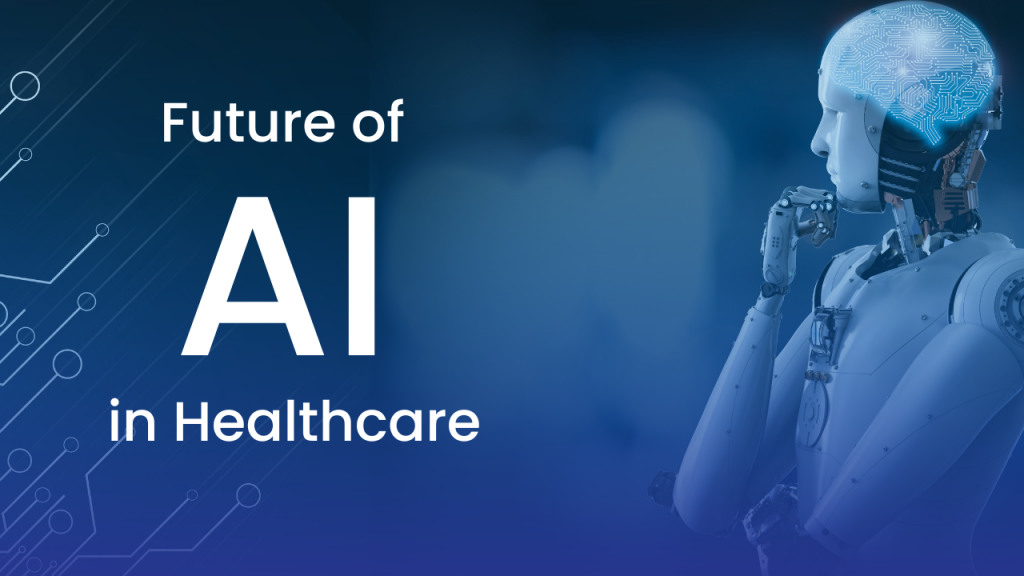Impact of Generative Artificial Intelligence in Healthcare
Have you ever pondered about the prominence of Generative AI in healthcare? Generative AI is emerging as an unavoidable tool, addressing some of the major challenges faced by the healthcare industry today.
One of the most popular examples is personalized medicine where Generative AI plays a valuable role in evaluating huge amounts of data, including patient databases, genomic information, etc., to customize treatment plans exceptionally for individual patients.
By leveraging Generative AI, businesses can effectively mitigate adverse effects by shifting from traditional, one-size-fits-all medical treatments to more personalized approaches.
Furthermore, Generative AI is also paving the way for modernizing development processes as well as drug discovery. Healthcare industries are leveraging AI-driven algorithms to design and simulate molecular structures, predict their properties, and address potential drug candidates faster and more effectively than ever before.
This elevated drug discovery pipeline minimizes the time and resources required to bring new treatments to market and enhances the probability of positive results in clinical trials, consequently leading to more effective therapies for patients.
Overall, Generative AI plays a crucial role in cultivating healthcare business ideas for startups, presenting a spectrum of growth opportunities within the industry.
Advantages of Generative AI in Healthcare
Let’s take a comprehensive look at the diverse benefits that Generative AI brings to the healthcare business landscape.
Personalized Treatment
With the assistance of Generative AI algorithms, businesses can efficiently analyze extensive datasets, including genomic information, patient history, lifestyle factors, and treatment outcomes. By integrating and interpreting this wealth of data, healthcare providers can tailor treatment plans to customize the patients necessities. This methodology guarantees that the treatments are more efficient, with fewer adverse effects, leading to improved patient outcomes and satisfaction.
Accelerated Drug Discovery
Experts believe that the traditional approach of drug discovery is not cost-effective and healthcare businesses need an innovative approach for the future. Generative AI can transform this process by utilizing machine learning algorithms to design, simulate, and analyze molecular structures in a fraction of the time it would take using conventional methods. Leveraging Generative AI enables healthcare companies to augment the development of new treatments for various diseases, identifying unmet medical needs and saving lives.
Enhanced Medical Imaging Analysis
Medical imaging is immensely advantageous in diagnosis, monitoring medical conditions, and treatment planning. Generative AI algorithms, powered by deep learning techniques, excel at interpreting and analyzing complex medical images, such as MRI scans, X-rays, and CT scans. With their ability to detect subtle abnormalities and patterns that may go unnoticed by human observers, these algorithms facilitate earlier detection of diseases, more accurate diagnosis, and improved treatment outcomes.
Predictive Analytics
Generative AI allows healthcare entrepreneurs to leverage the potential of predictive analytics by analyzing vast amounts of patient data to identify trends, patterns, and risk factors associated with certain diseases or conditions. By predicting potential health issues and disease progression, healthcare professionals can intervene proactively, implementing preventive measures and personalized interventions to mitigate risks and improve patient outcomes.
Precision Surgery
Surgical procedures necessitates peak precision to minimize tissue damage, reduce complications, and enhance patient recovery. Generative AI-centric surgical robots enhance surgical precision by demonstrating real-time guidance, assistance, and feedback to surgeons during complex procedures. By augmenting human capabilities with AI-powered technologies, these systems enable more precise and minimally invasive surgeries, concluding to optimistic results, effective patient recovery times, as well as shorter hospital stays.
Virtual Health Assistants
The significance of accessibility to healthcare services is unavoidable. Generative AI-centric virtual health assistants and chatbots showcase innumerable benefits by prompting valuable information as well as support. These virtual assistants can provide round-the-clock assistance, answer queries, schedule appointments, deliver impeccable medication reminders, and offer basic medical advice, empowering patients to manage their health more effectively and minimizing the burden on healthcare providers.
Cost Reduction
One of the biggest challenges the healthcare industry encounters is continued increased healthcare cost, putting strain on healthcare systems and restricting the uses of essential healthcare services for many individuals. Generative AI has the potential to mitigate these cost pressures by streamlining processes, optimizing resource allocation, and minimizing errors and inefficiencies in healthcare delivery. By focusing on the accuracy of diagnosis, minimizing unnecessary procedures and preventing unavoidable complications, Generative AI assists in reducing the overall healthcare cost while prioritizing the quality and efficacy of care.
Drug Repurposing
Identifying new uses for existing drugs, known as drug repurposing or repositioning, offers a cost-effective and time-efficient approach to drug discovery. With the assistance of Generative AI algorithms, healthcare businesses can evaluate huge amounts of biomedical data to address potential drug candidates with therapeutic effects on different diseases or conditions. By repurposing existing drugs for new indications, healthcare providers can expedite the development of treatments, reduce research and development costs, and bring novel therapies to market more quickly.
Continuous Learning and Improvement
One of the biggest achievements of Generative AI in healthcare is its continuous learning and development. Generative AI systems can learn and adapt continuously from new data and experiences, filtering the algorithm and augmenting performance overtime. By prioritizing the latest advancement in medical research trends treatment guidelines, Generative AI guarantees that healthcare providers have access to the most appropriate, accurate and latest information and insights, enabling them to deliver optimal care and achieve the best possible outcomes for their patients.
Final Words
In conclusion, the integration of Generative AI in healthcare brings about a profound transformation, revolutionizing every aspect of patient care, from personalized treatment plans and accelerated drug discovery to enhanced medical imaging analysis and predictive analytics. By harnessing the power of AI-driven technologies, healthcare providers can deliver more effective, efficient, and accessible care, ultimately leading to improved patient outcomes, reduced healthcare costs, and a brighter future for global healthcare delivery.
The post Impact of Generative Artificial Intelligence in Healthcare appeared first on Datafloq.

